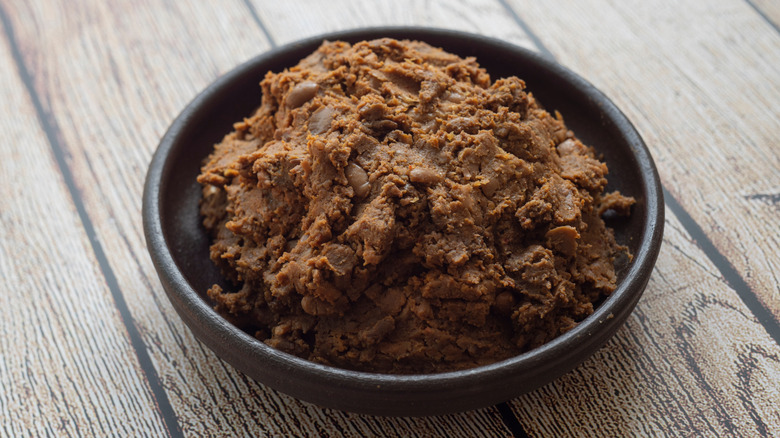Korean Doenjang Is The Secret To Adding A Savory Twist To Pasta
Pasta is an easy and versatile meal. Whatever you have in your fridge or pantry, it's usually quick to whip up a pot of pasta when there's little else in stock for dinner, and the add-in combinations are nearly limitless. However, given how common and easy it is to make, pasta can soon begin to feel dull for the home cook, especially for those who make it on a regular basis. If you're looking for a way to make your pasta feel fresh and less routine, a new ingredient may be key.
There's a simple way to add a savory twist to your pasta, and the key is doenjang. Doenjang is a Korean condiment made of fermented soybeans. It has a salty, umami taste that can easily elevate any number of dishes. Simply adding a bit to pasta results in a savory punch, making it a quick and easy way to upgrade your dish.
What is doenjang?
Doenjang is a Korean ingredient made of soybeans fermented in saltwater. It has a coarse texture reminiscent of chunky peanut butter. It is similar to miso in that it is used to add umami flavor to a dish; however, per MasterClass, doenjang is made from only soybeans and salt, whereas miso also contains koji starter and grains. In addition, miso has a milder taste. Doenjang ferments for anywhere from six weeks to months or even years. After the fermentation process is finished, the salt brine used to ferment the soy beans becomes soy sauce, or ganjang, and the solid paste is doenjang.
Many common Korean dishes incorporate doenjang. One of the most widely known is ssamjang, which is Korean barbecue sauce made of doenjang and gochujang. This condiment is popular because the saltiness of the doenjang is balanced out by the sweetness and heat of the gochujang. Another familiar dish is doenjang jjigae, a stew made with doenjang, meat, and vegetables. Doenjang can be found in Korean grocery stores and some Asian markets.
Doenjang gives pasta a savory transformation
Eric Kim of NYT Cooking demonstrates a creamy doenjang pasta. By first mixing the doenjang with milk, then finishing the pasta in the liquid blend, he dilutes this pungent ingredient while coating each strand of the linguine. This results in a savory fusion dish that he describes as tasting almost cheesy, with little time and few cooking steps.
Doenjang is an easy way to amp up your pasta because just a bit can alter the taste of the dish. The profile is comparable to that of blue cheese; the smell is very sharp, and the flavor is very salty. Therefore, a little of this paste goes a long way. A dash of this condiment can easily liven up your pasta, making it a quick way to add some oomph to your meal. With little additional time and one ingredient, the simplest pasta dish can become incredible. Try it to upgrade your pasta sauce and make your routine pasta night delicious.


